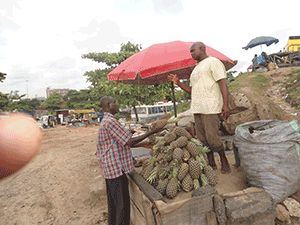Innocent Okwudinka is by no means poor, having made good money selling babies’ and ladies’ wears imported from Indonesia. He used to travel to Indonesia, Pakistan and other Asian countries to bring in the stuff.
For 10 years, he was comfortable selling ready made wears until the demands of the business began to clash with a yawning gap in his soul.
Okwudinka (right) attending to a customer.
He opted to trade in used clothes imported from neighbouring Cotonou in Benin Republic.
Next, he relocated to Burkina Faso to trade in motor vehicle spare parts. He bought from Nigeria and travelled there to sell. For almost four years, he was a trans-border, auto parts dealer based in Burkina Faso.
Yet, he did not find fulfilment in the business because it left him little or no time to serve God.
God, he said, has enlisted him to spread the Gospel and win souls to the kingdom of heaven, the neglect of which he said impeded his success in all businesses he ventured into.
From importer of ladies’ wears to trading in pineapples
To prepare for the divine call, Okwudinka needed a business that could fetch him both cash and comfort while serving God.
He chose trading in pineapples imported from Cotonou, which he sold for five years along with one of the pioneers of the business, named Uche. They had met in the 1990s in Onitsha, where they both sold imported ready made clothes.
Selling pineapples has been good business until recently when profit shrank. No thanks to middlemen and large scale dealers who now buy directly from farmers and resell to Nigerian wholesalers.
Okwudinka learnt the trade by observing Uche who was a pioneer, after they had reunited and become neighbours in the Mile 2 area of Lagos.
Huge demand pushes price up
The prices of different bulk sizes of pineapple in the Beninoise pineapple market were stable until demand pressure from Nigeria hit new highs. Dozens of carloads leave the Seme border for Lagos daily to satisfy the huge appetite for the sweet pineapple variety.
The bulk sales are categorised into ordinary lines 1-4, and 5. Each bulk has a price range. The price for categories 1-4, which used to cost N14,000 or less, first rose to N16,000. Two weeks later, it rose to about N17,000.
Bulk dealers steadily pushed the price up over a period of time from less than N8,000. As bulk prices shot up, retail prices also did. A medium size pineapple, which used to cost between N50 and N60, now sells for about N100. A big size, which sold for N100, now goes for about N130 or more.
Profit was impressive until the business became an all-comers’ affair. As more and more Nigerians got into it, demand outpaced supply and wholesale dealers capitalised on the pressure to jack prices up.
Now, sellers complain that every business trip leaves them with little profit to justify the effort. Most pioneers of the trade have quit.
How Egun cartels operate
Having realised that Nigerians are falling over themselves for the business, cartels dominated by Egun farmers emerged to exploit Nigerians the more. Wholesalers buy directly from them and resell to Nigerians at prices set arbitrarily.
The cartels create artificial scarcity. They do not allow Nigerians into farms to buy directly from farmers. Only members can buy from farmers and resell.
Among traders, it is understood that Nigerians dare not go to the farms, and anyone who contravenes this understanding risks sanctions. No trader from Nigeria has ever been caught going against the unwritten rules of the trade.
Helpless Nigerians sustain trade
Surprisingly, hundreds of Nigerian traders fail to realise their strength and capacity to make or break the business.
“If one dealer declines to buy in protest against perceived unfair deals, another Nigerian goes ahead to buy and even gives you away,” said a dealer, who did not want his name in print.
Whereas, he added, dealers could stage a strike to humble the cartels “if only we realise that if we don’t buy, the pineapples get rotten.”
He recalled that the cartels were not there initially but sprang up like touts and capitalised on docility of Nigerians to make the trade difficult.
Pioneer wholesalers like Uche have left the business. Okwudinka also plans to leave it in the hands of somebody else to run it and share profit.
But the business goes on – with its cartels, risk of losses and humiliation in the hands of security agents on the border route to the farms in Benin Republic.











